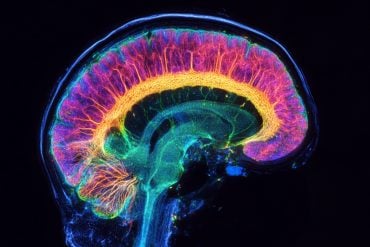Summary: According to researchers, even before a preterm infant is born, they may have alterations in the brain’s neural networks that could contribute to neurodevelopmental disorders.
Source: Yale.
Even before they are born, premature babies may display alterations in the circuitry of their developing brains, according to a first-of-its kind research study by Yale School of Medicine researchers and their colleagues at the National Institutes of Health (NIH) and Wayne State University.
The findings are published in the journal Scientific Reports.
According to the authors, 10% to 11% percent of American babies are born prematurely. This new study suggest that factors contributing to early birth might also impact the brain’s development in the womb, leading to significant neurodevelopmental disorders, such as autism, attention deficit hyperactivity disorder, and cerebral palsy.
In the study, Yale School of Medicine researchers Dr. Laura Ment, Dustin Scheinost, and R. Todd Constable collaborated closely with principal investigator Moriah Thomason of Wayne State University, and Dr. Roberto Romero, chief of the Perinatology Research Branch and Program Director for Obstetrics and Maternal-Fetal Medicine of NICHD/NIH.
The research team used fetal resting-state functional magnetic resonance imaging to measure brain connectivity in uteroin 32 human fetuses with normal brain anatomy, 14 of which were subsequently delivered preterm (between 24 and 35 weeks).
Patients were studied at Wayne State and Scheinost, assistant professor in the Magnetic Resonance Research Center at Yale School of Medicine, spearheaded the analysis using novel functional magnetic resonance imaging strategies to detect differences in neural networks between study groups.
The team found that systems-level neural connectivity was weaker in fetuses that would subsequently be born preterm. The findings were localized in left-hemisphere, pre-language regions of the brain.
“It was striking to see brain differences associated with preterm birth many weeks before the infants were prematurely-born,” said Scheinost. “Preterm infants are known to have brain changes in language regions, and we were particularly surprised that the fetal differences we detected were in these same language regions.”

Co-author Ment said these findings suggest that some prematurely born infants show changes in neural systems prior to birth. “Impaired connectivity in language regions in infants born long before their due dates needs further study, but is important for future research into both the causes and outcomes of preterm birth,” said Ment, professor of pediatrics and neurology at Yale School of Medicine.
The team’s future research will focus on potential causes of prematurity, such as infection and inflammation, to determine whether and how those conditions influence brain development in utero. They also will follow the study participants’ children to establish long-term outcomes.
Other authors on the study include Janessa H. Manning, Lauren E. Grove, Jasmine Hect, Narcis Marshall, Edgar Hernandez-Andrade, Susan Berman, Athina Pappas, Lami Yeo, and Sonia S. Hassan.
Funding: This project was supported by grants from the National Institutes of Health (MH110793 and ES026022), by a National Alliance for Research on Schizophrenia and Depression Young Investigator Award and, in part, by NIH contract HHSN 275201300006C.
Source: Karen N. Peart – Yale
Image Source: NeuroscienceNews.com image is adapted from the Yale press release.
Original Research: Full open access research for “Weak functional connectivity in the human fetal brain prior to preterm birth” by Moriah E. Thomason, Dustin Scheinost, Janessa H. Manning, Lauren E. Grove, Jasmine Hect, Narcis Marshall, Edgar Hernandez-Andrade, Susan Berman, Athina Pappas, Lami Yeo, Sonia S. Hassan, R. Todd Constable, Laura R. Ment & Roberto Romero in Scientific Reports. Published online January 9 2017 doi:10.1038/srep39286
[cbtabs][cbtab title=”MLA”]Yale “Brain Impairments in Preterm Infants May Begin in the Womb.” NeuroscienceNews. NeuroscienceNews, 9 January 2017.
<https://neurosciencenews.com/neurodevelopment-preterm-neonatal-5893/>.[/cbtab][cbtab title=”APA”]Yale (2017, January 9). Brain Impairments in Preterm Infants May Begin in the Womb. NeuroscienceNew. Retrieved January 9, 2017 from https://neurosciencenews.com/neurodevelopment-preterm-neonatal-5893/[/cbtab][cbtab title=”Chicago”]Yale “Brain Impairments in Preterm Infants May Begin in the Womb.” https://neurosciencenews.com/neurodevelopment-preterm-neonatal-5893/ (accessed January 9, 2017).[/cbtab][/cbtabs]
Abstract
Weak functional connectivity in the human fetal brain prior to preterm birth
It has been suggested that neurological problems more frequent in those born preterm are expressed prior to birth, but owing to technical limitations, this has been difficult to test in humans. We applied novel fetal resting-state functional MRI to measure brain function in 32 human fetuses in utero and found that systems-level neural functional connectivity was diminished in fetuses that would subsequently be born preterm. Neural connectivity was reduced in a left-hemisphere pre-language region, and the degree to which connectivity of this left language region extended to right-hemisphere homologs was positively associated with the time elapsed between fMRI assessment and delivery. These results provide the first evidence that altered functional connectivity in the preterm brain is identifiable before birth. They suggest that neurodevelopmental disorders associated with preterm birth may result from neurological insults that begin in utero.
“Weak functional connectivity in the human fetal brain prior to preterm birth” by Moriah E. Thomason, Dustin Scheinost, Janessa H. Manning, Lauren E. Grove, Jasmine Hect, Narcis Marshall, Edgar Hernandez-Andrade, Susan Berman, Athina Pappas, Lami Yeo, Sonia S. Hassan, R. Todd Constable, Laura R. Ment & Roberto Romero in Scientific Reports. Published online January 9 2017 doi:10.1038/srep39286






